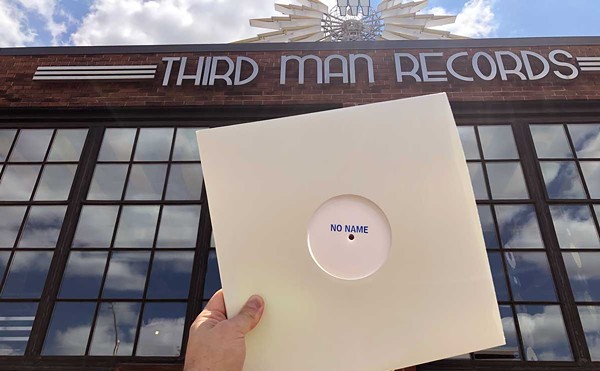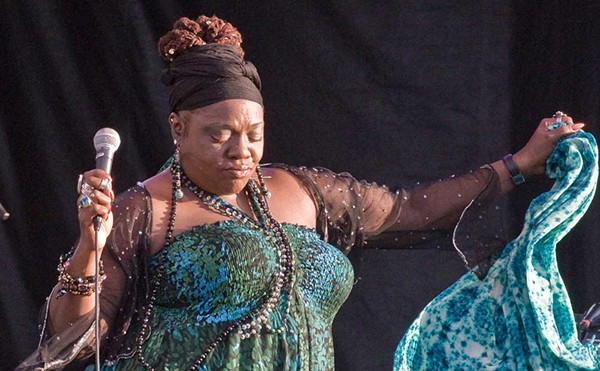It wasn't until Dave Lory had a curious encounter with a psychic in England during the summer of 1999 that he was able to entertain the idea of life after Jeff Buckley, who drowned in the Mississippi River two years earlier. The psychic made references to water and told a stunned Lory that Buckley wanted him to know that he hadn't meant to drown, but he didn't fight it, either. She also relayed Buckley's request for Lory to move on. "He's happy," she said. "Everything is fine."
As Buckley's friend and manager, Lory admits that it may never get easier to talk about his relationship with Buckley — which is, in part, why he decided to share his story, and in doing so, he has provided a beautiful and complicated portrait of one of the most enigmatic artists in music.
Lory released his memoir, Jeff Buckley: From Hallelujah to the Last Goodbye last month — 21 years to the day that Buckley disappeared into the cruel waters of the Mississippi River. Co-authored by music journalist Jim Irvin, Lory details his disenchanting first meeting with the singer (Buckley was nearly an hour late); the moment Lory knew that he had gained Buckley's trust which, he admits, was not easily earned; and the moment he received the call that his friend had disappeared.
In conversation, Lory toggles between the present and past tense — "Jeff is" and "Jeff was" — and truthfully, neither is incorrect. In the years since Buckley's passing, his only studio record, Grace, has remained both a stunning musical achievement and a tattered emotional history. "It's never over," Buckley wails on Grace's epic ballad, "Lover, You Should Have Come Over," a song that is often overshadowed by his haunting cover of Leonard Cohen's "Hallelujah." Lory secures this sentiment in his book, which has already become the unequivocal companion piece to Grace and, in many ways, an extension of Buckley's legacy.
Metro Times spoke with Lory about traveling with the singer, Buckley's fear of dying young, and why he has decided to take his heartbreaking book on the road.
Metro Times: So much of your time with Jeff, as detailed in the book, was spent travelling. Do you have a memory from that time with Jeff that stands out to you?
Lory: I would say — and I didn't realize it until a couple of years later — if you read the book and I was talking to him about the importance of attitude on stage, and more than two years later we were at L'Olympia in Paris at the second sold-out show — it's like a 3,000-seat venue — and he's surfing the crowd and they're ripping his shirt and they throw him back up on stage and then he comes running up the circle staircase backstage and he comes right back down and points at me and says, "Attitude," and I go, "Now you have it." The reason it was important is because you know on that first trip Jeff didn't trust anybody and for good reasons. I had to earn that trust and that moment showed me then he did trust me, and that meant a lot.
MT: How long did it take for that trust to be built?
Lory: I think I had it by the time we got to L.A. on that first tour because my lung collapsed. Jeff waited for everybody to leave and he comes up and he says, "Are you going to leave me like everybody else?" I saw the look on his face and the innocence. I told him then, "I'll never leave you," and I didn't. But he left me.
MT: Looking back, there are many references to death and dying sort of disguised throughout Grace. You've mentioned that Jeff allowed you to read some of his diary entries. Are you able to speak to why this may have been such a recurring theme in his work?
Lory: It was because his father died young. He was just really, I wouldn't say fascinated with death, but wanted to create as much work as he could before that time came, no matter how old he was, and so that's where I saw it, just putting himself under pressure to get as much work done as possible.
MT: What made you feel emotionally ready to finally talk about your relationship with him?
Lory: Well, I don't think I ever was, and it's still touchy right now. The boxes were still sealed from when he died, in my garage. When I had to write two chapters for the book publishers at my agency asked for the death chapter and I realized when I started doing the death chapter my wife was Jeff's promotion manager in Europe — that's how we met. So, everyday I see my wife and kids, I think of Jeff. I started writing the death chapter and I realized I hadn't grieved. I sat on the back porch and cried for three days while writing it. My wife kept coming out and saying, "Are you OK?"
In April I did a pre-taping for World Cafe. If you listen to it, there are five, six second gaps between the time I end and where she begins. The reason for that is she started crying after she asked me about when I got the call, and I was going, "Don't do this to me. I'm trying to get through this myself and here you are crying." We were giving each other Kleenex. So, it is touchy. I mean I do pretty well. Emotion is not a bad thing. I did a radio satellite tour and it was tough because it's like 15 10-minute interviews and at nine minutes in they're all asking about the death so I had to take a break. I want to put a stamp on his legacy, and when I finish the tour in October in Australia, I hope I can get on a plane in Sydney and I will never talk again and I'll look up and I'll ask the boy if I did him OK.
MT: Is there a part of you that felt a sense of responsibility to tell his story?
Lory: I do. Because nothing that has been written about him — there's a lot of things that are wrong in them and the authors, though all good writers, had no attachment to the subject matter, nor did they interview myself or the other seven or eight people I had in this book. They didn't know what questions to answer and questions to ask, and obviously Jim Irvin, my co-writer, who was at Mojo at the time as the editorial chief, and was with me the night I got the call that Jeff had disappeared while we were in Dublin — and it just all kind of came together.
It started by someone approaching me for a movie and it didn't work out, but I said at the time rather than do a screenplay I might as well write the book. I wanted to put a stamp on his legacy, so that 50 to 100 years from now if someone discovers Jeff, somebody can say, "Read this, this is the definitive book on Jeff." And although I wasn't there until [Live at Sin-é] was released, toward the end of Grace, and the second chapter the people that were with me were with Jeff. So I say there at the beginning, before I came in October of '93 I want to introduce you to a few people who were there before me, and that way you get the complete picture.
MT: The world was only briefly introduced to Jeff, he had the one record, he was gaining momentum, and in your book I think you so artfully portray him as having this power as a performer, but offstage he had this palpable fragility. Were these complexities something you wanted to share?
Lory: I did. I wanted to show the different sides of him.
MT: He was funny.
Lory: Yeah, he was hysterical. His imitations of me were just amazing. On the bus, nobody was safe. He had known me for five minutes and he had my gestures and my voice down, and he did it to everybody around him. I wanted people to have a peek behind the curtain of the artist-manager relationship, too, and know that it is like a marriage. You protect each other, but at the same time you do fight, you don't always agree. I thought that the normal person, even if they didn't know Jeff, could look at that and gain something out of it because it was a pretty wicked business back then. It wasn't for the faint of heart. It was the wild, wild West, which I thoroughly enjoyed.
The best compliments I've been getting about the book is that people feel like they are right there with me. You can't do any better than that.
MT: That being said, people, without even knowing Jeff, feel so close to him. Why do you think that is?
Lory: We used to make jokes about the album Grace. You know, I wasn't always the best at relationships, and if I would have had Grace before, I would have given it to the lady and said, "Here's what I'm trying to say." Jeff had that. I'm doing this so that I can reach more people.
MT: What are people most curious to ask you?
Lory: They're all curious about everything. They want to know what type of person he is.
MT: He was pretty ambitious. You had said in the book that he wanted to make like 18 records, that was sort of his end goal.
Lory: I was like, "That's a lot of records, dude." Jeff was a composer, he wasn't a songwriter. We always thought he was going to do Sgt. Peppers' or Queen's Night at The Opera because he was always about sound and how it comes together, and string arrangements. What was funny is he told me he wanted to do a Turkish record, and an MTV Unplugged with strings, and what he called "scary music," heavy metal. And he could do it all. That first year he was signed they didn't know what type of record was going to come out.
He was always showing songs to me. And I only heard a handful of them. I was with him a lot so I think a lot of them were written in his diaries, but they just never came out. Jeff was always last minute about everything. "Dream Brother" took 3 to 4 years, "Mojo Pin," "Grace," they all took multiple years to finish. "So Real" was about the only song that came together quickly that he just kept toying with things until he got them right.
MT: Did it come as a shock that his cover of Leonard Cohen's "Hallelujah" is widely considered the most definitive Jeff Buckley song?
Lory: No, it doesn't because about the third or fourth show we were on the road and I asked him, "You got to start doing a set list and quit talking between songs, get the bur out of your ass about your father and show them you're a different person." He put that ["Hallelujah"] as the encore and that first night you could hear a pin drop. And that's when we knew that was the live song that was going to do it. It's funny because I've met Leonard Cohen — it's tough for the songwriter who writes such a legendary song and then everybody thought that Jeff wrote it.
MT: Did Cohen give his approval?
Lory: He was OK with it, but he didn't look thrilled when I was introduced as Jeff Buckley's manager.
MT: It took Leonard Cohen several years to write the song which had 20-plus verses.
Lory: Eighty verses, actually. [Laughs.]
MT: And then this kid comes along... If there were one thing you would hope readers might take away from your experience with Jeff, what would you like that to be?
Lory: That Jeff was happiest when he was on the stage, that he loved giving everybody the gift of music, and he took it very seriously.
Dave Lory will conduct a reading and live Q & A on Saturday, June 30 at 7 p.m. at Saint Andrew's Hall; 431 E. Congress St., Detroit; 313-961-8961; saintandrewsdetroit.com; Tickets are $25.
Get our top picks for the best events in Detroit every Thursday morning. Sign up for our events newsletter.






